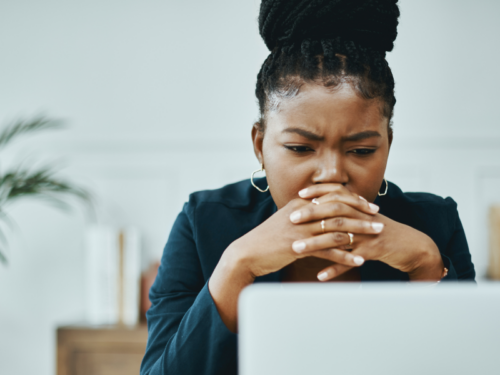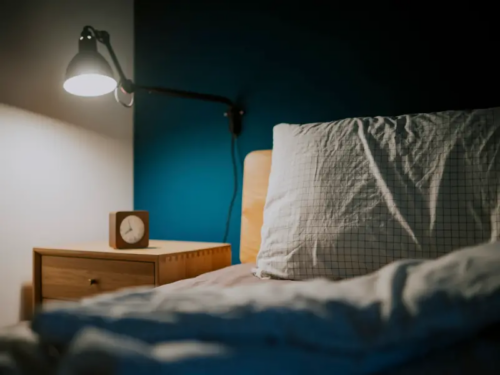
Table of Contents
What Is the Best Therapy for Anxiety?

Written By: Ashley Laderer

Clinically Reviewed By: Dr. Don Gasparini
February 25, 2023
9 min.
Anxiety is a common mental health issue, especially among teens and young adults. But what's the best therapy to help with anxiety? Find out here.
Learn more about our Clinical Review Process
Table of Contents
Anxiety is a widespread mental health concern among people of all ages. Around 31.9% of teens have had an anxiety disorder; similarly, 31.1% of adults in the US have an anxiety disorder at some point.
Experiencing anxiety can impact your day-to-day functioning and overall quality of life. It may be seriously debilitating and hinder school, work, social life, and romantic relationships.
It can be difficult to manage mental health conditions such as anxiety disorders on your own –– and that’s where therapy comes in. Working with a mental health professional to treat your anxiety can be life-changing.
Here’s what you need to know about best types of therapy for anxiety.
What is the best therapy for anxiety?
No one type of anxiety treatment or therapy is best for everyone across the board. Ultimately, the best therapy for anxiety will depend significantly on the individual and what type of anxiety disorder they have. For example, one type of therapy may be highly effective for someone with generalized anxiety disorder, while it may only provide minimal relief for someone with obsessive compulsive disorder –– and vice versa.
Furthermore, a mental health professional will often blend different therapeutic modalities to help someone best target their anxiety symptoms and other co-occurring mental health conditions. Determining what works best for you could take some trial and error.
Anxiety treatment can be effective whether you opt for online or in-person therapy. Additionally, it’s essential to be realistic and note that recovery isn’t going to happen overnight. You have to be consistent with therapy sessions and put in work outside your sessions to see a difference. Therapy and the work that goes along with it aren’t easy –– but it is certainly worth it.
Here are some of the best therapy modalities that are commonly used in the treatment of anxiety disorders.
Join the Charlie Health Library
Get mental health updates, research, insights, and resources directly to your inbox.
You can unsubscribe anytime.
Cognitive behavioral therapy (CBT)
Cognitive behavioral therapy is often one of the first lines of treatment for various mental health conditions, including anxiety disorders. This type of talk therapy can help you become more aware of your anxious thoughts and feelings, giving you the power to reframe negative beliefs. You will learn new coping skills and unique ways to deal with anxious thoughts, difficult emotions, and stress.

Much of CBT involves working with cognitive distortions. A cognitive distortion is an unhelpful, distorted way of thinking. Some examples of this are all-or-nothing/black-and-white thinking or catastrophizing and expecting the worst. CBT helps you work on cognitive restructuring, which means developing healthier thought patterns and behaviors by challenging your existing negative thinking patterns/cognitive distortions.
On top of cognitive restructuring, CBT may also involve learning some relaxation techniques that you can use in times of high anxiety or during a panic attack. These techniques include breathing exercises (like slow, deep breathing/diaphragmatic breathing) and progressive muscle relaxation.
Exposure therapy
Exposure therapy falls under the umbrella of cognitive behavioral therapy. It is most often used for people with phobias or trauma. Both trauma and phobias can drive you to avoid things, people, situations, or memories that trigger you. For someone with trauma, this may mean avoiding anything that reminds them of the traumatic incident. For someone with a phobia, this could mean avoiding any situation where they could be faced with their fear. Exposure therapy helps you safely and gradually expose yourself to these triggers, which can ultimately help you become more desensitized to them, decreasing your anxiety response. This will cause you to have less of a physical and emotional reaction to the triggers.
Exposure therapy can be done in a few different ways. For example, you may start by just visualizing or imagining something triggering and exposing yourself to it. Virtual reality exposure therapy is another option, where your therapist will use VR to expose you virtually to a trigger. This is particularly useful in cases where physically exposing yourself to your trigger isn’t feasible. Lastly, in vivo exposure involves physically exposing yourself to the phobia or anxiety trigger.
Exposure and response prevention (ERP)
Exposure and response prevention is a unique type of exposure therapy explicitly used to treat OCD. It involves exposure and response prevention, which is purposefully not engaging in compulsions. With the assistance and care of a mental health professional, you will expose yourself to thoughts, situations, or objects that trigger your anxiety or induce your obsessions. Then, once you have been triggered, you will not engage in the compulsion or compulsions that you usually do. This can certainly be uncomfortable and difficult for people with OCD. Still, ultimately, the process helps your brain learn that whatever is causing your obsessions is not a threat and that there won’t be “bad” outcomes, even if you do not engage in your compulsions.
Acceptance and commitment therapy (ACT)
ACT is a mindfulness-based therapy that involves acceptance. The premise is to accept your anxious thoughts and experiences without judgment. Additionally, ACT practitioners don’t look at symptom reduction as the “goal” of the therapy since, for some people, trying to push away anxiety symptoms can amplify them. Instead, the goal is to notice unwanted thoughts or sensations mindfully, have self-compassion, and create a meaningful life based on your personal values by committing to positive actions that help you reach your goals and live a rich life.
Dialectical behavior therapy (DBT)
DBT is a form of therapy that helps you understand and regulate emotions. You will also learn about acceptance and change –– accepting yourself and your current challenges while also understanding that you can make positive changes. In a DBT program, you will have individual therapy, skills training, and supported groups. The skills you will learn in DBT include mindfulness, distress tolerance, emotional regulation, and interpersonal effectiveness. DBT can be especially helpful if you have co-occurring borderline personality disorder (BPD).
Eye movement desensitization and reprocessing (EMDR)
EMDR is a unique type of therapy that utilizes your eye movements and bilateral stimulation to help you process traumatic and triggering emotional memories. This type of therapy is especially helpful if your anxiety is linked to trauma, such as post traumatic stress disorder. However, it can benefit people without PTSD, too. With a trained EMDR therapist, this method can help you process trauma more quickly, so you will feel reduced emotional and physical distress associated with the traumatic memories.
Compassion focused therapy (CFT)
Compassion focused therapy is a type of mental health treatment that’s especially beneficial for people who struggle with shame or self-criticism on top of their anxiety. You will learn mind-body awareness, mindfulness, and self-compassion. CFT can help you develop the ability to self-soothe in times of stress, increase your feelings of safety, and feel more empathy for other people. To aid in CFT, your therapist might use visualizations, meditation, or role-playing tools.
What are anxiety disorders?
Anxiety is often used as a blanket term, but various anxiety disorders have unique identifying symptoms. Some common anxiety disorders include:
Generalized anxiety disorder (GAD)
Generalized anxiety disorder is characterized by excessive worry and fear. This type of anxiety is tough to control and gets in the way of your day-to-day functioning. There might be a constant feeling of dread or thinking that something terrible will happen. If you have GAD, your anxiety might manifest physically, too, giving you headaches, stomachaches, or other unexplained pains.
Obsessive compulsive disorder (OCD)
OCD is a condition that consists of two main components: obsessions and compulsions. The obsessions and compulsions are very distressing and, at times, debilitating. Obsessions can surround any theme, including but not limited to germs or contamination, fear of losing control, taboo sexual thoughts, or violent thoughts. These obsessions are linked to unwanted intrusive thoughts that are quite overwhelming. Compulsions are carried out in response to these unwanted thoughts. They may include excessively washing your hands, repeatedly checking something, arranging things in a particular way, or seeking reassurance.
Panic disorder
Panic disorder is linked to recurring panic attacks, which are brief “attacks” that come on suddenly and intensely. During a panic attack, you might feel physical symptoms like chest pain, feeling like you can’t breathe, dizziness, and trembling. When you aren’t having a panic attack, you might fear having another one and avoiding situations that might trigger a panic attack.
Phobias
If you have a phobia, you have an extreme and intense fear of something, even if it isn’t imminently dangerous. You may understand that your fear is disproportionate, but nonetheless, it will make you feel severe panic. This can cause you to go to great lengths to avoid what you fear, and if you’re faced with the trigger, you might have feelings like trouble breathing, nausea, or a rapid heartbeat. Some common phobias include public speaking, flying, heights, or spiders.
Post-traumatic stress disorder (PTSD)
PTSD is technically an anxiety disorder. It occurs to some people who have experienced or witnessed a traumatic event or events. PTSD causes people to have distressing thoughts about the traumatic instances - and sometimes even flashbacks where it feels like the traumatic event is happening. If you have post-traumatic stress disorder, you might avoid people, places, or things that remind you of the event. You may also feel hypervigilant or irritable or have trouble experiencing positive emotions.
Do you need more support with
your mental health?
Charlie Health can help.
Separation anxiety disorder
Separation anxiety disorder is usually linked to younger children, but it’s also possible in teens and adults. If you have this disorder, you may have extreme anxiety surrounding getting separated from someone you’re attached to. You might be terrified that something terrible will happen to them and experience uncomfortable physical symptoms and sensations when you are away from them or anticipating being away from them.
Social anxiety disorder
People with social anxiety disorder have intense fear surrounding social situations, including a fear of being judged by others. If you have social anxiety, you might feel very self-conscious in social situations and be afraid that people are watching you or noticing your anxiety. Physical symptoms like blushing, racing heart, sweating, or stomachaches may occur. All of this can make it hard for you to converse with people, especially new people.
Self-care for anxiety
On top of finding the best therapy for anxiety for your unique situation, practicing self-care can help reduce your stress levels and anxiety symptoms. Here are some ideas:
- Live a healthy lifestyle: Exercise regularly since being active and getting at least 15 minutes of daily physical activity can help boost your mood and decrease stress. Eating a healthy and balanced diet can also help improve well-being.
- Sleep well: Getting enough good quality sleep is crucial. Sleep deprivation can worsen your anxiety.
- Abstain from substances: Abstaining from drugs and alcohol will benefit health overall and prevent any worsening of anxiety. You may even consider limiting or cutting out caffeine since this can trigger anxiety or panic attacks in some people who are sensitive to caffeine.
- Get creative: Finding a creative outlet for your emotions, such as music or art, can help you to relax and express yourself.
- Maintain social support: Surrounding yourself with loved ones and avoiding isolation can help keep your morale up. Support groups with other people with anxiety disorders can also help you feel less alone.
Medication for anxiety
In some cases, people need a combination of therapy and medication to experience the most significant relief from anxiety. A mental health professional can assess your situation and determine if you might benefit from medication. You may be referred to a psychiatrist –– a doctor who specializes in mental health and can prescribe psych meds. There isn’t a one-size-fits-all anxiety medication.
Some examples of different types of medications used to treat anxiety disorders are:
- Antidepressants
- Anti-anxiety medications
- Beta-blockers
How Charlie Health can help
If you are a teen or young adult with an anxiety disorder, Charlie Health may be able to help you.
Our virtual intensive outpatient program provides personalized services for teens, young adults, and families dealing with various mental health conditions, including anxiety disorder and co-occurring conditions.
Dealing with a mental health condition can feel extremely difficult at times, but there is hope for you to manage it and stop letting anxiety rule your life. With professional care and a supportive community, you can start feeling better.
Begin your healing journey with Charlie Health today.
References
https://www.nimh.nih.gov/health/topics/anxiety-disorders
https://adaa.org/find-help/treatment-help/types-of-therapy
https://focus.psychiatryonline.org/doi/10.1176/appi.focus.20200045
https://medicine.umich.edu/sites/default/files/content/downloads/Relaxation-Skills-for-Anxiety.pdf
https://contextualscience.org/files/article%20psychOz.pdf
https://www.apa.org/ptsd-guideline/patients-and-families/exposure-therapy





